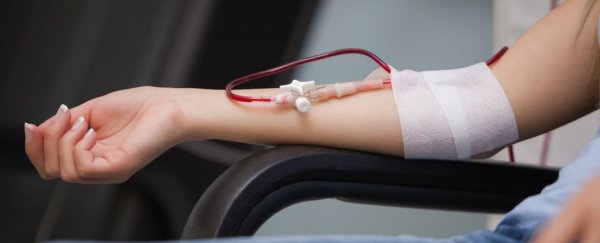Scientists have discovered that a particular type of enzyme can cut away antigens in blood types A and B, to make them more like Type O - considered the 'universal' blood type, because it's the only type that can be donated to anyone without the risk of provoking a life-threatening immune response.
The team, from the University of British Columbia of Canada, worked with a family of enzymes called 98 glycoside hydrolase, extracted from a strain of Streptococcus pneumoniae. Over many generations, they were able to engineer a super high-powered enzyme strain that can very effectively snip away blood antigens where previous generations of the enzyme struggled. "A major limitation has always been the efficiency of the enzymes," one of the team, Stephen Withers, said in a press release. "Impractically large amounts of enzyme were needed."
Getting the right type of blood when you need it is crucial, and it has to do with the different types of residue that can accumulate the surface of red blood cells. Both blood types A and B have this residue - A has an N-acetylgalactosamine residue, and B has a galactose residue - and Type AB has a mixture of both. Only Blood Type O is free from this residue, which means it can be received by any patient, no matter what type they're carrying.
Withers and his team managed to create their 'mutant' enzyme strain using a technology called directed evolution, which allows them to insert many different types of mutations into the gene that codes for it, and by progressively selecting strains that are the best at snipping away the blood antigens, were able to create an enzyme that's 170 times more effective at it than its parent strain. They published their results in the Journal of the American Chemical Society.
"The concept is not new, but until now we needed so much of the enzyme to make it work that it was impractical," said Withers. "Now I'm confident that we can take this a whole lot further."
While the current enzyme strain is not yet capable of removing 100 percent of the antigens from Blood Types A and B, which is where it needs to get if the researchers want to make any real use of it, the team is confident that they'll get it there so they can try it out in clinical trials. Even the smallest amount of antigen in donated blood can set off a dangerous immune response in the recipient.
"Given our success so far, we are optimistic that this will work," says Withers.
